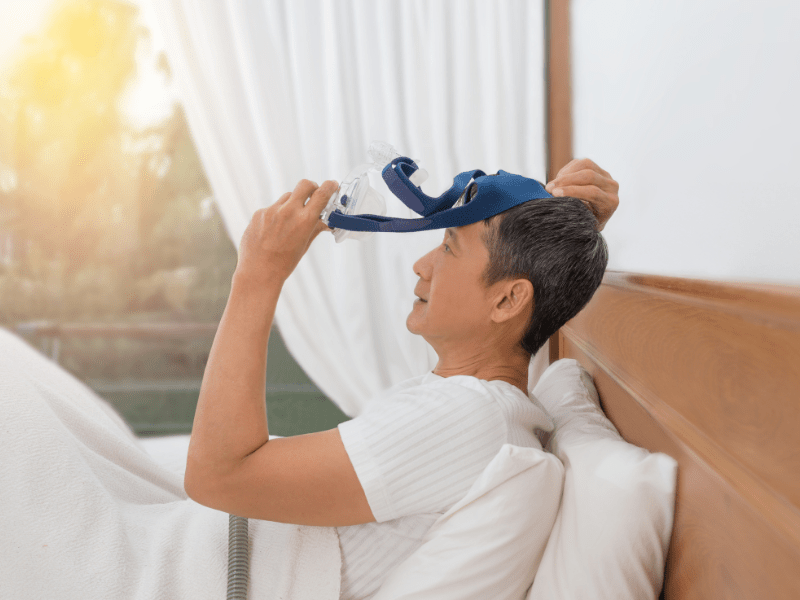Introduction
Do you frequently wake up with a sore jaw or headache due to teeth grinding during your sleep? You're not alone - this condition, known as Bruxism, affects many people worldwide. This article will guide you through the process of choosing the right mouth guard to prevent nighttime teeth grinding.
Dive in and explore how a mouthguard could be your first step towards better nights and brighter mornings.
Causes and Symptoms of Teeth Grinding
Teeth grinding, or bruxism, is a common sleep disorder that impacts many individuals. Chronic teeth grinding often sparks from stress or anxiety but can also be a result of alcohol consumption, smoking, caffeine intake or specific types of medications. Sleep apnea, another prevalent sleep disorder, may contribute significantly to developing this grinding habit. The symptoms range from subtle to severe and might vary between patients. Outside observers often first notice nighttime teeth clenching and tooth wear as they're easily perceptible signs indicating the presence of bruxism.
The individual suffering might experience disrupted sleep quality owing to frequent awakenings. Furthermore, chronic teeth grinding can lead to TMJ disorders along with headaches and persistent jaw pain that hinders daily activities. In extreme cases, constant grating wears down enamel leading to increased tooth sensitivity and even chipped or flat teeth over time.
Becoming aware of these causes and symptoms can help connect the dots if you suspect you might be battling bruxism. There's ample assistance available for improving your night-time wellness starting with dental night guards specifically designed for this purpose.
Choosing the Right Mouthguard for Teeth Grinding
- Understand the different types of mouthguards available for teeth grinding, such as over-the-counter options and custom-made guards
- Consider the severity and frequency of your teeth grinding to determine which type of mouthguard is most suitable for you
- Consult with a dental professional to get expert advice on choosing the right mouthguard
- Take into account your personal preferences, including comfort and ease of use, when selecting a mouthguard
- Look for a mouthguard that is FDA-approved and meets safety standards
- Consider any additional features or benefits that may be important to you, such as durability or ease of cleaning
- Take proper care of your mouthguard by following the manufacturer's instructions for cleaning and maintenance
- Be aware that it may take some time to find the right mouthguard that works best for you, as effectiveness can vary from person to person.
Conclusion
In conclusion, using a mouthguard for grinding teeth while you sleep can be an effective solution for individuals suffering from bruxism. It provides a protective barrier between the upper and lower teeth, preventing tooth wear and alleviating symptoms such as jaw pain and tooth enamel wear.
Remember to consult with a dental professional to choose the right mouthguard for your specific needs and ensure proper usage. Say goodbye to restless nights and hello to improved sleep quality with a reliable mouthguard.
FAQs
1. How does a mouthguard prevent teeth grinding while you sleep?
A mouthguard acts as a protective barrier between your upper and lower teeth, cushioning the impact of grinding or clenching. It helps to redistribute the pressure and prevents damage to your teeth, jaw muscles, and temporomandibular joint (TMJ).
2. Can I wear a mouthguard if I have braces or other dental appliances?
Yes, there are specially designed mouthguards that can be used with braces or other dental appliances. These mouthguards provide protection for both your teeth and the orthodontic hardware while ensuring proper fit and comfort.
3. Is it necessary to wear a custom-fitted mouthguard for teeth grinding?
While over-the-counter options are available, it is highly recommended to get a custom-fitted mouthguard from your dentist or orthodontist. Custom-fit ensures maximum comfort, effectiveness in preventing teeth grinding-related issues, as well as durability for long-term use.
4. How often should I replace my mouth guard?
It is advisable to replace your mouth guard every 6-12 months depending on its condition and regular usage. Regular inspection for signs of wear such as thinning edges or tears is important to ensure optimal protection against teeth grinding during sleep.
iSense will improve your sleep quality through customized comfort. Don’t compromise on great sleep. Try an iSense adjustable-firmness mattress risk free for 180 nights. If your kids are causing problems with jumping on a mattress, take a look at our article on why you should stop them from doing so.






















